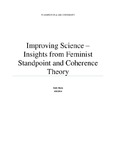Improving Science -- Insights from Feminist Standpoint and Coherence Theory (thesis)

View/
Author
Raza, Zain
Subject
Washington and Lee University -- Honors in Philosophy
Science
Feminist theory
Multiculturalism
Foucault, Michel, 1926-1984
Metadata
Show full item recordDescription
Thesis; [FULL-TEXT FREELY AVAILABLE ONLINE] Zain Raza is a member of the Class of 2014 of Washington and Lee University. I will begin with a brief exploration of what science is commonly thought to be, and provide a philosophical schema for choosing between scientific theories. This discussion will introduce the complex nature of scientific theory choice and show how individual beliefs and values can influence theory choice and research. Second, I will examine problematic scientific theories highlighted by feminist epistemologists, explain how the fundamental flaws of these theories were connected to the social locations of the scientists who created them, and articulate how diversity resulted in drastic improvement of these theories. Third, given that diversity is important to scientific communities, I will begin to explore the type of diversity we ought to be concerned with having. Fourth, I will discuss how sex and gender are constituted. I will begin by discussing some of the more obvious features of gender in our society before turning to how gender is “achieved” by individuals and exists as a self-perpetuating, hierarchical social institution. Fifth, I will defend the feminist standpoint epistemologist position on diversity, appealing to the special features of social locations such as gender, race/ethnicity, and class. Sixth, I will discuss these insights in the context of Linda Martín Alcoff's coherence theory and the idea of knowledge-power as a mutually constituting dyad. In particular, I will show how Michel Foucault's normative and epistemic account of local and hegemonic knowledges can be used to support the claims of feminist standpoint theory. Lastly, I will discuss how science would benefit from the changes suggested by feminist standpoint critique. [From Introduction] Zain Raza